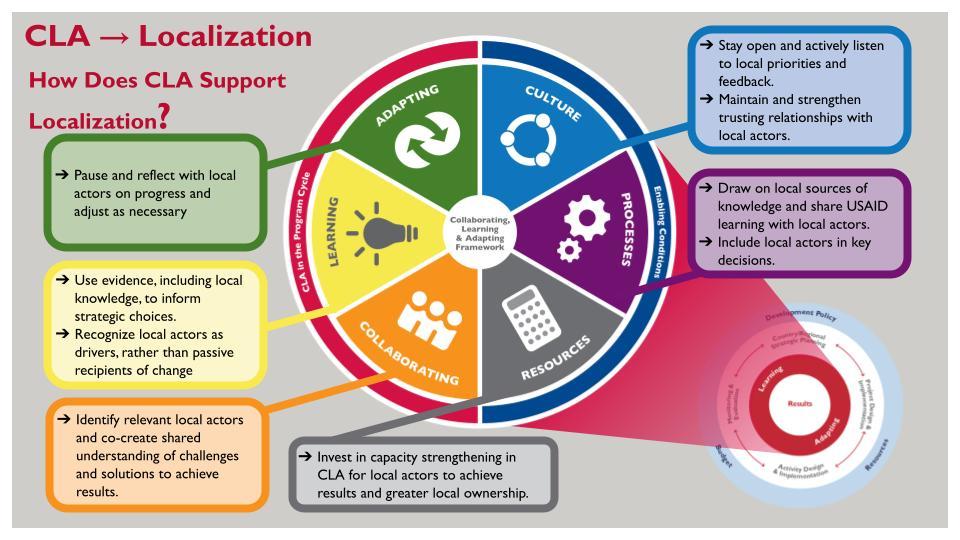Reflections on Bite-Sized Learning: Operationalizing Localization through CLA

Image: How Does CLA Support Localization?
Development is inherently about change. But change is never easy. And to have staying power, change must be locally led. USAID and its partners are demonstrating how Collaborating, Learning and Adapting (CLA) is vital to the Agency’s efforts to advance locally led development by elevating local leadership over USAID programs, strengthening local systems, and responding to the needs of local communities. Through CLA practices that value local knowledge, co-create solutions with local actors, and seek—and listen to—feedback from local stakeholders, USAID and its partners create meaningful space within USAID-funded programs for local actors to exercise agency and decision-making power over how development happens for their own communities.
On November 7th, I was honored to join three CLA Case Competition winners in an informal conversation about how to better integrate CLA into our work. This session of USAID’s ongoing Bite-Sized Learning series focused on teams who made their development activities more locally led by building a culture of continuous collaboration, learning, and adapting. We heard from Elizabeth Issac of the Institute for Development Impact, based in India; Botswana-based Relebohile Faatse, from Global Communities; and Domini Coelho, from USAID/Timor-Leste. A recap of the session can be found here on USAID Learning Lab, together with the recording and other associated materials.
Each panelist emphasized that CLA helps bring a wider range of local knowledge and perspective to the planning, implementation, and monitoring of development programming. Local knowledge is crucial, because local actors best understand the challenges and opportunities inherent to their context, as well as the relevant stakeholders, their relationships, and the range of capacities they bring to affect change in their communities.
As the audience engaged with the panelists, it became clear that, despite sometimes taking extra time and effort, people really want to do the work required to make development locally led and recognize CLA as a core practice, or set of practices, to do so. For instance, Relebohile and her team were impressed to see that their partners prioritized hiring a dedicated CLA staff member. Devoting resources toward this effort highlighted their commitment to CLA, knowing that CLA approaches are critical for pursuing sustainable development. Talking to local people and learning from them is the path to local ownership; it surfaces the priorities of those whose lives will be affected, elevates local solutions and capacities, and emphasizes contextual relevance.
Domini in Timor-Leste had a similar outlook. Not only did CLA help the activity reach enthusiastic rural youth who USAID hadn’t previously engaged, it also elevated the expertise of Timorese staff at the USAID mission, drawing on their connections and local knowledge to map out relevant stakeholders.
I also appreciated Elizabeth’s example which highlighted that when organizations are unafraid to learn and to review and adjust their initial theories of change, they can boost their impact. Elizabeth also underscored that incorporating CLA to make activities more locally led can be simple. Practicing—and benefitting from—CLA, doesn’t require a complete overhaul of existing processes. Many can be incorporated into your everyday work. (To that end, add these CLA tips and tricks to your toolkit).
Finally, a cross-cutting theme from the three examples explored during the session is that CLA can and should be done by everyone: by USAID and by implementing partners of all types, local or international. CLA practices are so important for advancing USAID’s localization goals that the Agency is working to understand more systematically the extent to which our programs employ CLA approaches in ways that elevate local leadership over USAID programs. You can learn more about that work here.
It was a true pleasure to join this conversation, to learn from colleagues and partners, and I’m looking forward to future events in the Bite-Sized Learning Series!



